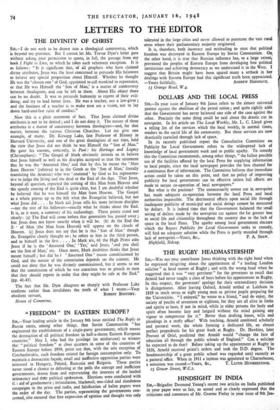4 , FREEDOM" IN. EASTERN EUROPE?
Snt,—Your leading article in the January 9th issue entitled The Reply to Russia states, among other things, that Soviet Communism " has engineered the establishment of a single-party government, which means the destruction of all political freedom in half-a-dozen Eastern European countries." May I, who had the privilege (or misfortune) to witness that " political freedom " at close quarters in some of the countries of Eastern Europe before 1939, point out that, with the sole exception of Czechoslovakia, such freedom existed for foreign consumption only. To maintain a democratic facade, small and ineffective opposition parties were tolerated in Hungary, Poland, Rumania and Bulgaria. These parties never stood a chance to defeating at the polls the corrupt and inefficient governments, drawn from and representing the interests of the landed aristocracy and their political spokesmen. Elections were conducted with tl. aid of gendarmerie ; intimidation, blackmail, one-sided and slanderous campaigns in the press and radio, and falsification of ballot papers were the order of the day. The parties, representing the governments con- cerned, also ensured that free expression of opinion and thought was only tolerated in the large cities and never allowed to penetrate the vast rural areas where their parliamentary majority originated.
It is, therefore, both incorrect and misleading to state that political freedom was destroyed in Eastern Europe by Soviet Communism Oil the other hand, it is true that Russian influence has, to a large extent, prevented the peoples of Eastern Europe from developing free political institutions and achieving democracy as we understand it in the West. I suggest that Britain might have been spared many a setback in her dealings with Eastern Europe had this significant truth been appreciated.


































 Previous page
Previous page